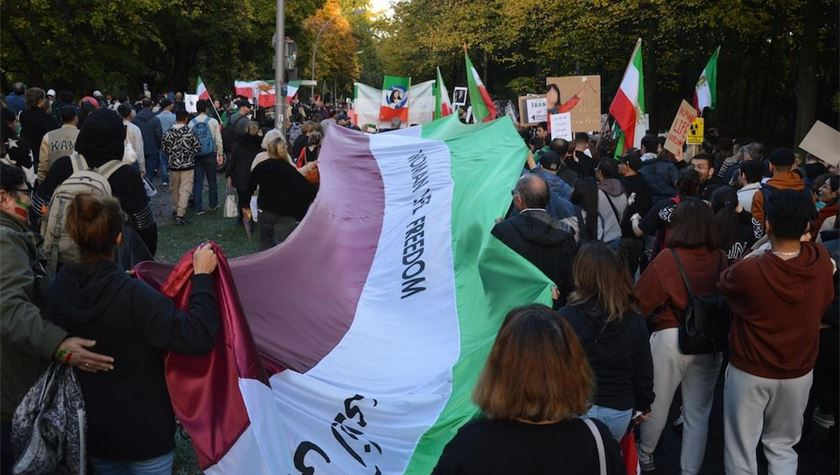
While the Council of the European Union has sanctioned 11 individuals and four entities for their role in the death of Mahsa Amini and the violent response to the recent protests in Iran, the bloc must take more aggressive action
Mahsa Amini was 22 years old when she was arrested by the morality police in Tehran on 13 September for allegedly failing to properly wear the hijab. Three days later, Amini died after reportedly being beaten by the same Iranian forces.
Since her death, Iranian men and women have been flooding the streets to form the largest protest movement that the country has seen in years against the daily systematic oppression and persecution that they face. So far, over 100 civilians have lost their lives, and thousands more have been injured or arrested.
Iranian men and women have been flooding the streets to form the largest protest movement that the country has seen in yearsOn 17 October, the Council of the European Union agreed to a new package of human rights-related sanctions against 11 Iranian individuals and four entities linked to Tehran’s crackdown on protesters and the death of Amini – including Iran’s morality police. It is in this context that there is a need to reflect on how Europe’s narrowly focused pursuit of a nuclear deal (officially called the Joint Comprehensive Plan of Action, or JCPOA) has prevented it from taking meaningful action against ongoing human rights violations in Iran.
In a joint letter to the EU’s Foreign Affairs Chief Josep Borrell on 26 September, 51 MEPs called for the EU Global Human Rights Sanctions Regime to be applied to Iran’s morality police, the Islamic Revolutionary Guard Corps (IRGC) and other Iranian law enforcement agencies.
As the protests have spread to all 31 provinces of Iran, the Islamic Republic has made it clear that it is willing to take ever more desperate and violent measures to contain them. On 2 October, security forces stormed Iran’s prestigious Sharif University of Technology; videos on social media showed some of Iran’s best and brightest young minds entrapped and shot at by regime agents in a garage. Other footage indicates severe beatings of protesters. The government has also increased censorship and shut down the internet.
As the most powerful military institution in the Islamic Republic, the IRGC have used the ongoing protests as an excuse to inflame regional tensions. It was reported that the IRGC attacked Kurdish groups in Iraq, who they claim are supporting the protests, including a drone attack on 27 September that killed at least 14 people, including an American citizen, and left several others injured.
Meanwhile, more than a month after submitting a “final text” in an effort to salvage the Iran nuclear agreement, EU negotiators continue to await a response from the Islamic Republic’s leaders. As they wait, the Iranian people continue to suffer at the hands of a merciless regime.
One of the major sticking points in the current nuclear talks is Tehran’s insistence of enough economic guarantees to make the accord worth the regime’s while. Conversely, there is a severe risk for businesses who invest in Iran, including European firms, of unwittingly funding these same repressive forces killing, maiming and oppressing the Iranian people. These two seemingly opposing considerations are why the nuclear deal has proven so problematic.
As [EU negotiators] wait, the Iranian people continue to suffer at the hands of a merciless regimeDespite the regime’s many aggressions, the EU has not shown much of an appetite to bite back. Excluding the most recent sanctions package, Brussels has only levied two rounds of sanctions on Iran since 2013 – once in 2019 after a failed plot to carry out a bomb attack outside Paris and again in 2021 for human rights abuses.
Even after the IRGC launched an attack on the Mercer Street commercial vessel in 2021, which killed two European nationals, the EU never levied sanctions. The same silence was heard after Tehran’s provision of lethal drones to Russia for its invasion of Ukraine, an EU candidate country, and Iran’s cyberattack on the critical infrastructure of Albania, another EU candidate country and Nato member. To date, no sanctions have been levied by the EU for this hostile activity, which is unacceptable considering that Brussels retains the ability to impose non-nuclear sanctions without violating the JCPOA.
While the skeleton of a nuclear agreement may still be salvageable, these second-order effects must be considered. For too long the EU has been paralysed by inaction. Unless and until the EU demonstrates that it can push back hard on Iran’s other menacing behaviour, any nuclear deal that is inked will not stand the test of time.
The murder of Mahsa Amini is a painful wake-up call to Europe that its focus on securing a nuclear deal has prevented meaningful action in response to the Islamic Republic’s continuous human rights violations. The regime’s deeply concerning security partnership with Russia is further cause for action. There is no more time to waste. Europe must aggressively apply non-nuclear sanctions on Iran. The sanctions applied on 17 October are but a start.
